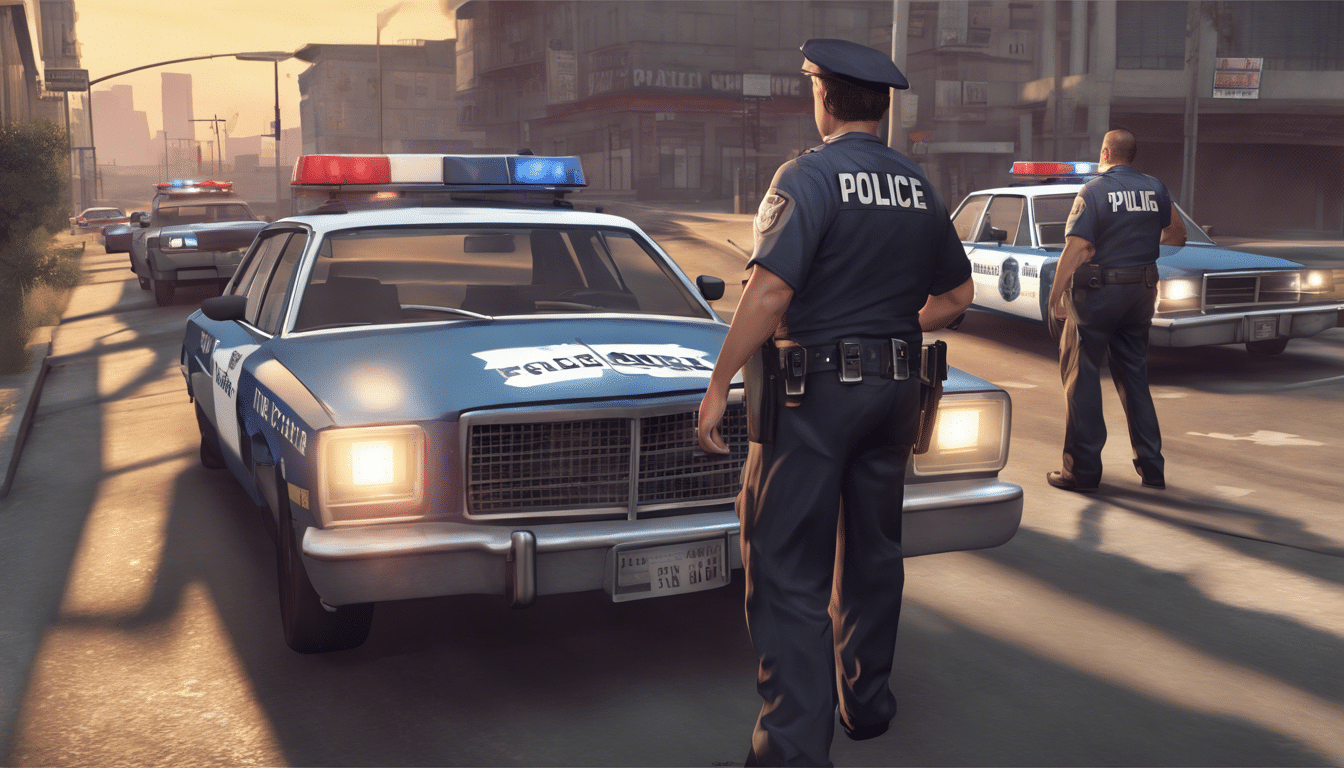Dive into the heart of the action with GTA Police, the game that promises a thrilling chase in pursuit of the most daring criminals! In this article, discover how this fast-paced hunt for criminals plays out in the captivating world of Grand Theft Auto. Get ready for an adventure full of suspense and twists and turns!
The Mission of the Forces of Order in GTA V
Daily Tasks and Responsibilities
In the vast and realistic universe of Grand Theft Auto V, law enforcement plays a crucial role, especially in missions where the protagonists frequently find themselves in conflict with the law. Life as a police officer in Los Santos is anything but ordinary, filled with patrols, heavy-handed interventions, and high-speed chases through the city’s bustling streets. From arresting fleeing criminals to raiding gang hideouts, every day is an adventure for law enforcement.
The Impact of Wanted Level
Arguably one of the most exciting features of GTA V is the Wanted Level system. This dynamic mechanism governs the intensity of police interventions depending on the illegal actions committed by the player. The higher the wanted level, the more aggressive the police, and even tactical teams, become in their pursuit. This often leads to chaotic situations where only the most skilled players manage to escape the relentless grip of law enforcement.
Police Strategies
Police Stations throughout Los Santos
Interactions with Civilians
In addition to chases and shootouts, GTA V also allows law enforcement to interact with civilians. These interactions range from simple questioning to checking vehicles suspected of containing illegal goods. These moments add a layer of realism and illustrate the mission of law enforcement to maintain peace and security within this tumultuous city.
The Forces of Order and the Heists
Online Modes and Law Enforcement
With a city that never sleeps and ever-present crime, law enforcement in GTA V offers formidable opposition for players. Whether it’s small infractions or major crimes, the vigilance and responsiveness of Los Santos police officers guarantees a constant and exciting challenge for anyone who dares to cross the boundaries of the law in this virtual world.
The Issues and Challenges of Police Pursuits
Preparation and Tactics of Law Enforcement
With the rise of urban chases in video games and their captivating staging, it is crucial to think about how real law enforcement prepares and acts in similar situations. Careful tactical planning begins long before the sirens sound. Police officers must be trained to respond to a multitude of unpredictable scenarios while minimizing risk to civilians.
The choice of vehicles, high-speed driving training and practical simulations are an integral part of this preparation. Being able to anticipate a suspect’s movements and remaining calm under pressure are essential skills, as one mistake can have fatal consequences.
Technology and Innovation
The advent of new technologies has radically transformed police pursuits. Helicopters equipped with thermal cameras, surveillance drones, and increasingly sophisticated GPS systems allow police officers to track suspects more effectively and coordinate their actions with increased precision.
Technology is not just for tracking; it also helps prevent prosecution. For example, traffic management tools and automatic license plate recognition systems can identify suspicious vehicles long before a pursuit begins.
Coordination and Communication
Coordination between different police units is crucial to the success of a pursuit. Clear and effective communication can make the difference between an uneventful arrest and a situation that gets out of hand. During a high-speed chase, law enforcement must synchronize their movements, share information in real time and adapt their strategies quickly.
High-frequency radios, secure communications channels and sophisticated tactical applications play a critical role in maintaining this coordination. The goal is to create a safety net around the fugitive while minimizing risks to third parties.
Risks for Civilians and Police Officers
Police pursuits always involve a high degree of risk. Whether on crowded city streets or on high-speed highways, the potential for collision and injury is ever-present. Police officers must constantly weigh the need to pursue against the potential dangers to the public.
Quick decision making is crucial. Officers must choose the ideal moment to intervene, weighing the risks of a prolonged chase against the possibility of the suspect’s escape. Non-prosecution policies in certain contexts illustrate the importance of this constant evaluation.
Legal and Ethical Challenges
Police pursuits are often fraught with legal and ethical challenges. Law enforcement must operate while respecting the rights of suspects while protecting public safety. This tension can become particularly complex in high-risk situations.
Legal guidelines vary widely from jurisdiction to jurisdiction. For example, some areas place strict restrictions on the use of force, while others allow more aggressive means of stopping a fleeing suspect. In addition to legal considerations, police officers often have to deal with public judgment and media suspicion, which adds an additional layer of pressure.
Psychological Impact on Agents
Chases can have profound psychological effects on police officers. The constant tension, immediate danger and enormous responsibility can lead to post-traumatic stress and other mental health problems. Law enforcement must have access to resources to manage stress and obtain adequate support after traumatic incidents.
The training is therefore not only limited to physical and tactical skills, but also includes mental resilience programs. Understanding and managing the emotional impact of their work is crucial to their career longevity and overall well-being.
Police Tactics and Strategies in Game
Importance of Advanced Policing Tactics and Strategies
The need for advanced training in police tactics and strategies is undeniable in the context of complex operations and high-risk interventions. These training courses aim to improve the skills of law enforcement, making them able to react effectively to various threats. Police officers learn to quickly analyze critical situations, make precise tactical decisions, and work in coordination with their colleagues to ensure everyone’s safety.
Skills Development in Crisis Situations
A good understanding of advanced tactics allows police officers to manage crisis situations calmly and effectively. For example, during a hostage situation, they must be able to communicate discreetly, plan interventions carefully and neutralize threats without causing collateral damage. Training often includes realistic simulations to prepare agents to face the most extreme scenarios. A shooting simulation can even put officers in real conditions to sharpen their reflexes.
Use of Technology and Specialized Equipment
Advanced training also includes the use of cutting-edge technologies and specialized equipment. Today, law enforcement has drones, bomb-disposal robots and sophisticated surveillance systems at their disposal. These tools enable better surveillance, the collection of crucial information, and more secure interventions. Added to this are advanced communication techniques to coordinate the efforts of different units on the ground.
Case Study: Tactical Intervention Groups
A concrete example of the importance of this training is illustrated by tactical intervention groups (GTI) like that of the SQ. These specialized units intervene in large-scale situations where mastery of advanced tactics is essential. Their rigorous training and technical expertise often place them on the front lines during perilous operations.
Management of Demonstrations and Urban Conflicts
The training also addresses the specific challenges posed by protests and urban conflicts. Police officers must know how to manage crowds, recognize potential threats and implement strategies to contain disruptive elements. Interacting with groups like the black blocs requires a thorough understanding of their well-practiced methods of evading police, as well as tactics for effectively neutralizing them.
Ethics and Professionalism in the Police Environment
Finally, ethics and professionalism are at the heart of advanced training. Police officers must learn to carry out their duties with integrity, respecting civil rights and avoiding the use of excessive force. Scandals and accusations of violence or racism tarnish the reputation of law enforcement, making the need for ongoing, rigorous training crucial to maintaining high standards of professional behavior.
The Impact of Crime Gameplay on the Gaming Experience
Immersion thanks to the Police Role
The integration of the police role into video games offers a unique immersion. Playing as a law enforcement officer allows players to immerse themselves in realistic scenarios, often drawn from the daily life of law enforcement. For example, games like “L.A. Noire” or “Sleeping Dogs” appeal with their ability to recreate high-intensity criminal investigations and chases. The realism provided by this type of gameplay intensifies the player’s commitment, inviting them to take on not only a uniform, but also a moral responsibility.
Varied Gameplay Mechanics
Police gameplay enriches the gaming experience with a variety of mechanics. The investigations, interrogations, and chases form a complex and diverse whole. For example, intense shooting segments, like those found in “RoboCop,” test players’ precision and reflexes in a chaotic urban environment. At the same time, meticulous investigation sequences allow you to exercise your analytical mind, thus offering a fluctuating but always captivating pace of play.
Adrenaline and Chases
Chases are a key element of games with police gameplay. Franchises like “Need for Speed” exploit this mechanic to create thrilling scenes and unrivaled adrenaline rushes. The tension builds with every sharp turn, every adrenaline rush as you try to outrun or catch up with the criminals. These intense moments add a cinematic dimension to the games, making each chase memorable.
A Captivating and Disturbing Reality
Some detective games push the boundaries of realism to offer a sometimes disturbing, but extremely captivating experience. “Unrecord,” for example, is a shooter so realistic that it can make players feel uncomfortable. This level of detail not only contributes to immersion, but also encourages intense reflection on the actions carried out in the game. This heightened realism allows total immersion in credible and tension-filled scenarios, making each decision fraught with consequences.
Role Psychology
Taking on the role of police officer goes beyond pure action. It’s also a complex psychological exploration, as each choice can have repercussions on the unfolding of the story. Games like “Beyond: Two Souls” deeply impact players through the complexity of the moral dilemmas and narrative choices they impose. The cumulative effect of the results of each decision makes the experience deeply personal and, ultimately, memorable.
The Narrative Immersion Challenge
Narrative depth is crucial for this type of gameplay. The costumes, regional accents, and immersive dialogue contribute to the credibility and authenticity of the scenes. For this reason, every detail counts and contributes to a coherent and immersive universe. The developers’ ability to create a world where every element feels authentic undeniably enriches the gaming experience, transporting players into a fascinating and complex alternate reality.






Leave a Reply